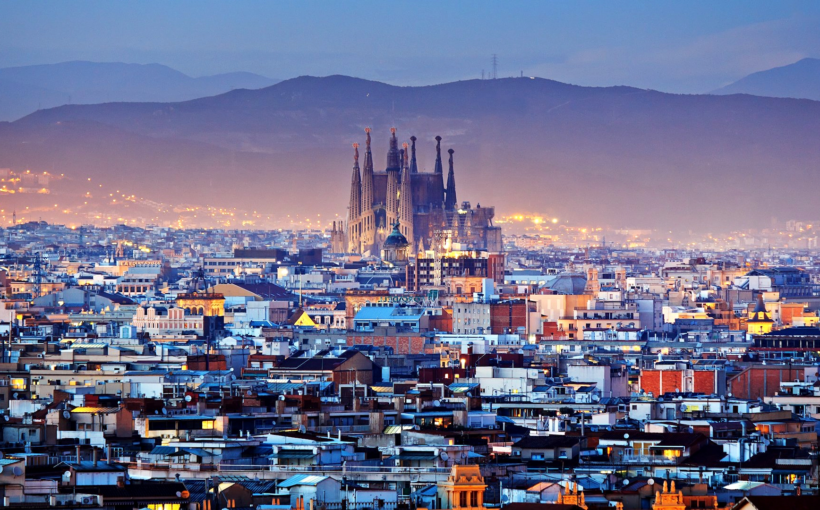A radical transformation of the economic model. Barcelona wants neighborhoods where people can reside, work and visit. This is one of Barcelona’s main aims in launching the Green Deal: the economic roadmap for 2030. The government team has carried out an exhaustive analysis of how the city’s reactivation has to be tackled after the pandemic. And it has identified elements that will be key to this journey now embarked upon: economic competitiveness; sustainability; social equity; green and digital transition; future jobs and more.
These are just a few of the main challenges the planet is facing — recently added to which are disruptive phenomena such as the pandemic — and the increasingly-fast speed of change of these challenges requires greater effort in planning, innovation and investment. It is in this context that Barcelona starts from an advantageous situation owing to its pioneering position in European-level investments and its geographical location, turning it into a hub with very diversified connections.
From culture to logistics, talent attraction and tourism investment, Barcelona is the ninth most-attractive city in the world for living in, travelling and visiting according to the latest World’s Best Cities report — and the fifth best city on the entire planet for establishing startups (EU-Startups 2020). If we narrow our focus geographically, Barcelona takes third place as ideal city for creating a startup — according to the European body tasked with monitoring the ecosystems of such enterprises, Startup Heatmap Europe.
And that’s because Barcelona city council has made a big commitment in establishing its International Welcome Desk, located strategically in the 22@ district, as a welcome gateway for attracting international talent, researchers, investors, entrepreneurs and highly-qualified professionals. The 22@ district has been an economic driving force for the city over the past 10 years, even in times of crisis. And the city council is aiming, under the Green Deal, to give it a new impetus as a strategic point in the city’s future.
As for the entrepreneurship ecosystem, the Catalan capital has risen to seventh place in the ranking for the whole of Europe in attracting investment in technology companies and has quadrupled the amount of investment received in 2021, reaching €1.5 billion according to data published by Atomico’s State of European Tech.
Where is Barcelona’s economic future heading? How does the city see itself as it approaches 2030?
But the advantages that need to be consolidated and the accelerating pace of our times requires constant reflection and revision of city assets. What are the main challenges and big opportunities? Where is Barcelona’s economic future heading? How does the city see itself as it approaches 2030?
Barcelona will be creating over 120,000 jobs under the Green Deal roadmap between this year and 2030. And to do this, the city council has established five main economic poles of attraction and seven strategic sectors.
The Zona Franca, Montjuïc, Barcelona city center, the 22@ district, the Besòs hub and South Diagonal Scientific Node. It is on these six poles that Barcelona’s economic diversification strategy will depend. No other city in the Spanish state is in the position that the Catalan capital finds itself in for achieving this.
The commitment to digital enterprises, the culture sector and cultural industries, local commerce, quality tourism that is respectful and responsible towards the community, establishing electric cars as a mobility element and continued commitment to the green economy which, from this point on, also encompasses the sea, are the seven sectors covered by the Green Deal.
REACT 2022 will be an event open to the city’s residents and sectors involved in Barcelona’s development
And how will all this be done? With public-private partnerships as its spearhead. Barcelona city council aims to create a range of opportunities for private initiatives to lead to a natural growth from the point of view of investment and economy. Public-private partnerships must encourage investments and ensure that enterprises, universities, research centers, researchers, international talent and more, put Barcelona at the helm of Europe as a pioneering city in innovation.
Many of these issues are included in the summary of the second Barcelona REACT Conference 2022, an event taking place at Barcelona’s Disseny Hub from March 30 to April 1, bringing together hundreds of representatives from local, national and international economic sectors and featuring over 60 speakers, who will be reflecting on our city’s economic promotion with a view to the 2030 Agenda.
All these projects covered in the Barcelona Green Deal aim to make the city more competitive, sustainable and fair
REACT Conference. The Green Deal up to 2030
Barcelona REACT 2022 will be an event open to the city’s residents and sectors involved in Barcelona’s development. It will include analyses of initiatives such as the economic restructuring of the city center, cultural connections with Latin America, the integration of creativity and design into industry, sportstech sector opportunities and the promotion of innovation and various strategic areas for economic development. All these projects covered in the Barcelona Green Deal aim to make the city more competitive, sustainable and fair over the coming years.
For further information on Barcelona REACT 2022 and to register for the conference, please see the barcelona.cat/react website.
Source: Politico



